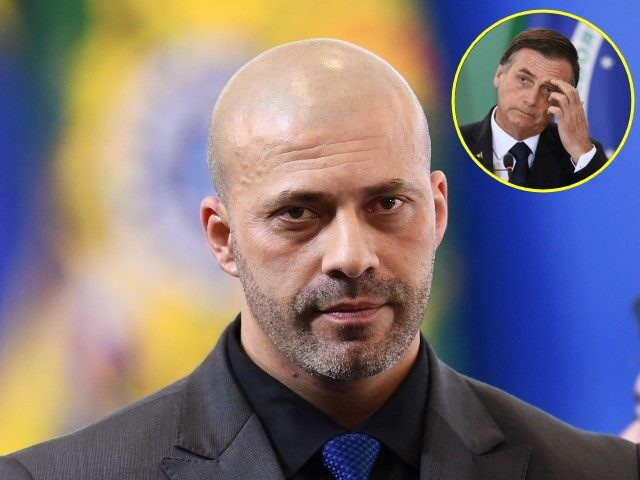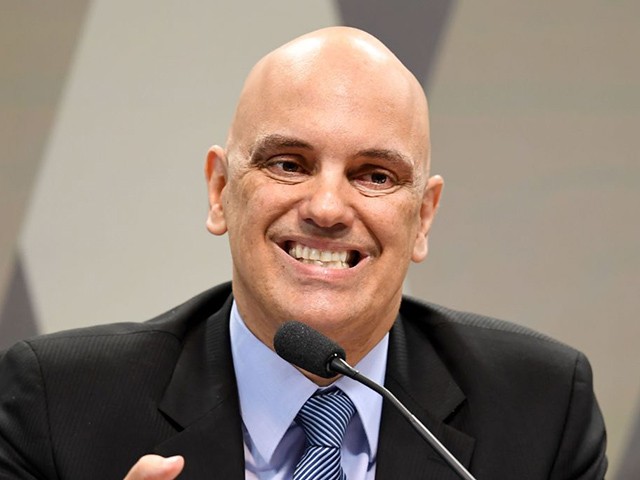The Supreme Federal Tribunal (STF) of Brazil, the nation’s top court, overturned a pardon on Wednesday that former President Jair Bolsonaro had issued to conservative former lawmaker Daniel Silveira last year, a move opponents described as blatantly violating the constitutional separation of powers.
Silveira, a former member of the Chamber of Deputies, the lower house of the Brazilian Congress, was arrested in 2021 for publishing a video on his YouTube page insulting the STF. The current top judge on the STF, “fake news” crusader Alexandre de Moraes, claimed at the time that the video describing himself and other judges as having “no character, no scruples, no morals” was illegal because it incited violence against the judiciary. Police ultimately arrested Silveira, himself a former police officer, and Brazil’s courts sentenced him to eight years in prison for his political commentary in the video.
Following the sentence, Bolsonaro issued a pardon to the lawmaker on the grounds that Brazil’s constitution granted citizens freedom of expression.

President of Brazil Jair Bolsonaro looks on after a press conference two days after being defeated by Lula da Silva in the presidential runoff at Alvorada Palace on November 1, 2022, in Brasilia, Brazil (Andressa Anholete/Getty Images).
The STF ruled on Wednesday 8-2 (the court typically has 11 members, but currently has a vacancy) that Bolsonaro’s pardon, a power granted to the executive by the Brazilian constitution, was invalid, opening the door for Silveira to serve his original eight-year prison sentence. According to the Brazilian news outlet G1, the justices differed in their logic for invalidating a constitutional move by the president. Minister, as the STF justices are formally titled, Luiz Fux, claimed that the pardon was illegitimate because Silveira’s crime, publishing a video on YouTube, was “political.”
“I understand that a crime against the democratic state of law is a political crime and inadmissible for amnesty [pardon],” Fux wrote in his decision.
Another minister, Edson Fachin, claimed that there were unspecified “moral” limits to the use of pardon power that Bolsonaro had allegedly trespassed. The president [chief justice], Rosa Weber, in turn, argued that Bolsonaro’s pardon was “disconnected from the public interest” and thus illegal, though the Brazilian constitution puts no such limits on pardon powers.
The two dissenting justices concurred that the Brazilian constitution grants the judiciary no power over the president’s pardons.
“The allegations of the occurrence of misuse of purpose, violation of the principles of impartiality and morality are, in fact, an attempt to examine the merits of the government issuing a pardon, which is clearly inadmissible in the light of the 1988 Federal Constitution,” Minister Nunes Marques wrote.
Minister André Mendonça, who also dissented, disagreed with the claim that there was no “public interest” in pardoning Silveira, asserting that the conviction and sentencing of a Congressman to prison for expressing a political opinion had caused widespread public outrage and that Bolsonaro’s pardon offered “pacification.”
Silveira is already in prison after being sentenced on charges of “undemocratic acts” in a separate case. Those charges did not result in prison time, but Minister de Moraes obligated Silveira to wear an ankle bracelet and banned him from using social media, demands Silveira responded to with what de Moraes described as “complete disrespect and debauchery.” De Moraes ordered Silveira imprisoned in February. De Moraes also suspended Silveira’s firearms licenses and any passport in his name.
Paulo César de Faria, Silveira’s attorney, accused the STF of “definitively burying the federal constitution” with its decision on Wednesday.
“The only thing left is an invitation to the seventh-day [funerary] Mass,” he added.
The STF is the court of last resort in the country, so Silveira will likely have no avenue to appeal.
During his time in Congress, Silveira regularly published social media videos commenting on various political issues. The offending video, from 2021, included a rant against the STF demanding the Bolsonaro government remove all 11 ministers and replace them on the grounds that they were “unpalatable.” Silveira described the justices as “not good for shit for this country” and “hav[ing] no character, no scruples, no morals.” He also described himself as imagining Justice Edson Fachin “taking a beating.”
“What are you going to say? That I am fomenting violence?” he asked in the video. “No, I am just imagining. … Any citizen imagining a well-issued beating in that face of yours … it’s not a crime.”
Following Silveira’s initial arrest, the court freed him on the conditions that he abstain from social media use and offenses to the court. Silveira refused to stop commenting publicly.
“I have no respect for the order, I have the respect for the judiciary that Alexandre de Moraes has for the legislative,” Silveira declared in March 2022. “So that respect … you see that he has no limits now. He’s a runaway train. I think he’s a moron, too.”
De Moraes revoked the bail provisions and commanded Silveira’s arrest, resulting in a bizarre episode in which Silveira barricaded himself in Congress, invoking legislative immunity and preventing police from detaining him. De Moraes fined him 15,000 reais (currently $3,023.95) a day for the violation and opened a new criminal case against him for contempt, ultimately forcing him out, as Silveira said he could not afford the fines and provide for his family.
In April 2022, the STF sentenced Silveira to eight years in prison for publishing the YouTube video.
“Freedom of expression exists for the manifestation of opposing opinions, jokes, satires, for wrong opinions, but not for criminal opinions, hate speech, an attack on the democratic state of law,” STF Minister Alexandre de Moraes asserted at the time.
“It is very easy to say, ‘Daniel Silveira, take care of your own business.’ I am not going to say that,” then-President Bolsonaro said, announcing a pardon that same month. “I was a Congressman for 28 years and, in that House, with all its possible defects, that is where the essence of democracy is, too.”
Bolsonaro’s decree issuing the pardon stated that “freedom of expression is an essential pillar of society in all of its manifestations” and that Silveira’s release was necessary to preserve that pillar.


COMMENTS
Please let us know if you're having issues with commenting.